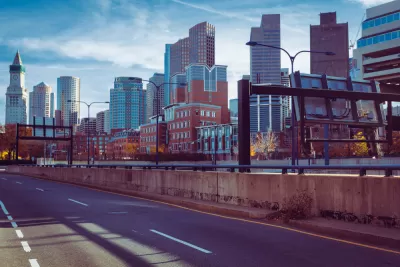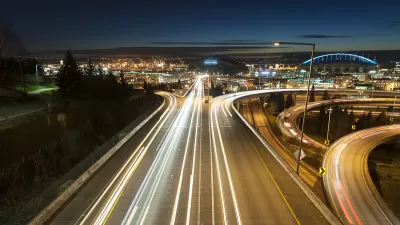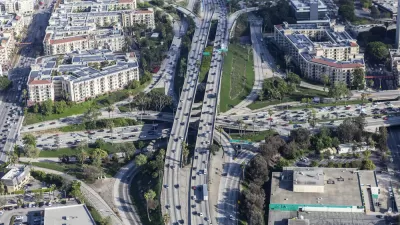The compelling reason behind Boston's looking at congestion pricing is traffic congestion, unlike Seattle where it is being viewed as a major way to reduce greenhouse gas reductions and fund public transit.

"Two cities on the United States’ east and west coasts, both with epic local traffic problems, are considering congestion pricing as a way to get people and goods moving again," writes Bill Cramer, communications director for the International Bridge, Tunnel and Turnpike Association (IBTTA), on April 12.
Planetizen readers may have read on April 6 that "Seattle will develop a plan to toll city roadways as part of its efforts to reduce traffic congestion and greenhouse-gas emissions." The proposal has the backing of Mayor Jenny A. Durkan.
The news was reassuring to pricing advocates who had seen the New York State legislature on March 30 fail to include plans in its budget legislation for a future cordon toll to apply to trucks and passenger vehicles in Manhattan's central business district.
On April 6, Durkan released the Seattle Climate Action plan, with a prominent role played by congestion pricing for good reason considering that two-thirds of Seattle’s climate emissions result from road transportation, according to Durkan.
=============================================================================================
In Boston, traffic congestion, not climate change, is the compelling reason why congestion pricing is being discussed.
"According to a study released this month, Boston drivers spend the highest percentage of their time stuck in traffic compared to any other city in the country," reported Nik DeCosta-Klipa on Feb. 20 for Boston.com.
INRIX, a transportation analytics firm, found that drivers in Boston spent 14 percent of their drive time in congestion in 2017. The city was also tied with San Francisco for highest rate of time in congestion during rush hour at 23 percent.
Unlike Seattle, where Mayor Durkan is backing cordon area congestion pricing, there doesn't appear to be a prominent leader advocating for the pricing strategy. In fact, Mayor Marty Walsh withdrew his support for a pilot project to apply congestion pricing to curbside parking, according to Planetizen last September:
Mayor Walsh is quoted directly in the [Boston Herald] article, describing the failed expectations of the pilot project he launched in January: "If it doesn’t make a significant improvement in cutting back traffic, I don’t see any reason for surge pricing,” he said. Mayor Walsh is not quoted considering whether cheaper parking might inspire more people to drive, thus creating more congestion.
Yet one academic's name emerges in many articles. UCLA urban planning professor Michael Manville may not live in Boston, but he hails from the area.
"Manville was recently in town, and my TransitMatters colleague Josh Fairchild and I had a chance to record a Commonwealth Codcast with him [on Jan. 22]," writes James Aloisi in an opinion for Commonwealth Magazine on Feb. 11.
Manville ... asserted that the only proven way to manage and reduce congestion is to put a price on the use of the highway and charge drivers an appropriate cost for the use of the facility... Manville made a compelling case that we have very valuable land – the highways that get us to our destinations – and we give that away for free.
Manville indeed makes a convincing case for congestion pricing in the 27-minute Soundcloud tape. Among his many other salient points:
- Congestion will lead people to take transit but transit will not reduce congestion as it does nothing to change driver behavior.
- The modal playing field between transit and driving gets "leveled" when you price the roads rather than giving them away.
- As for the equity issue, that tolls are regressive, he questions why the solution should be to make the product free for everyone. Like any other public good, subsidies can be targeted to those in need.
- Tolls are not the best revenue-generators. Gas taxes are better because of lower administrative costs. However, smart tolling is the only way to eliminate traffic congestion.
- He distinguishes a user fee, such as a road or bridge toll, from a "fee for service" that delivers tangible benefits, like being able to drive at least 45 mph on a congested freeway, even if costs over $40.
Aloisi adds his own commentary:
Pricing is the only proven and effective way to get people to shift modes. We wouldn’t need to invest in new technology to adopt a congestion pricing policy. We already know that we can charge variable toll rates through the current EZ-Pass system [sic], because we do it to provide well-deserved neighborhood discounts.
There is growing interest in the city and region to tackle the issue of traffic congestion in an effective way. We cannot be afraid to experiment with approaches like smart tolling, congestion pricing, charging for miles traveled, and carbon fees on non-residential parking in urban settings.
In addition to discussing a cordon toll like Gov. Andrew Cuomo (D-N.Y) had initially considered for Manhattan and Mayor Durkan is proposing for Seattle, a good place to show the benefits of pricing would be to apply congestion pricing to Massachusetts' only toll road, the Massachusetts Turnpike (I-90).
It won't be easy. The Boston Globe reported on Feb. 27 that polling results from 709 Massachusetts voters found that "38 percent supported raising tolls during rush hours as a way to decrease traffic, while 55 percent oppose the idea."
Manville lays out the case for congestion pricing in a Medium article that was also published by Seattle's KUOW on April 9. One of his most compelling arguments is dealing with the equity challenge. "It isn't clear that all roads should be free because some drivers are poor," he writes.
FULL STORY: Boston And Seattle Look To Congestion Pricing

Trump Administration Could Effectively End Housing Voucher Program
Federal officials are eyeing major cuts to the Section 8 program that helps millions of low-income households pay rent.

Planetizen Federal Action Tracker
A weekly monitor of how Trump’s orders and actions are impacting planners and planning in America.

The 120 Year Old Tiny Home Villages That Sheltered San Francisco’s Earthquake Refugees
More than a century ago, San Francisco mobilized to house thousands of residents displaced by the 1906 earthquake. Could their strategy offer a model for the present?

HSR Reaches Key Settlement in Northern California City
The state’s high-speed rail authority reached an agreement with Millbrae, a key city on the train’s proposed route to San Francisco.

Washington State Legislature Passes Parking Reform Bill
A bill that would limit parking requirements for new developments is headed to the governor’s desk.

Missouri Law Would Ban Protections for Housing Voucher Users
A state law seeks to overturn source-of-income discrimination bans passed by several Missouri cities.
Urban Design for Planners 1: Software Tools
This six-course series explores essential urban design concepts using open source software and equips planners with the tools they need to participate fully in the urban design process.
Planning for Universal Design
Learn the tools for implementing Universal Design in planning regulations.
Ada County Highway District
Clanton & Associates, Inc.
Jessamine County Fiscal Court
Institute for Housing and Urban Development Studies (IHS)
City of Grandview
Harvard GSD Executive Education
Toledo-Lucas County Plan Commissions
Salt Lake City
NYU Wagner Graduate School of Public Service





























